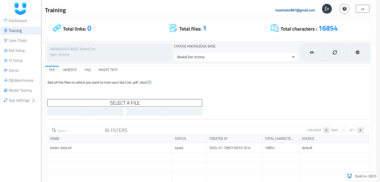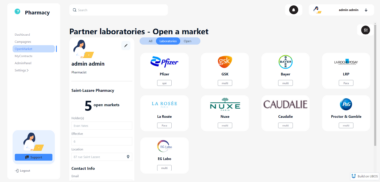UBOS Asset Marketplace: MCP iOS Simulator Screenshot - Bridging AI with iOS Development
In the rapidly evolving landscape of AI-driven development, the ability to seamlessly integrate AI models with existing software ecosystems is paramount. The UBOS Asset Marketplace recognizes this critical need by offering a robust selection of tools and integrations that empower developers to leverage the power of AI in innovative ways. One such asset, the MCP iOS Simulator Screenshot server, bridges the gap between AI models and iOS development, enabling powerful new use cases in automated testing, AI-assisted UI design, and intelligent app analysis.
Understanding MCP and Its Role in AI Integration
At the heart of this integration lies the Model Context Protocol (MCP). MCP is an open protocol designed to standardize how applications provide context to Large Language Models (LLMs). In essence, it acts as a universal translator, allowing AI models to understand and interact with data and functionality exposed by different applications. By adhering to the MCP standard, applications can unlock their potential for AI-driven automation and analysis.
The MCP iOS Simulator Screenshot server exemplifies this principle. It provides a standardized way for AI models to access and interpret the visual output of the iOS Simulator, opening up a wealth of possibilities for AI-powered development workflows.
Use Cases: Unleashing the Power of AI in iOS Development
The MCP iOS Simulator Screenshot server unlocks a diverse array of use cases, empowering developers to leverage AI in novel and impactful ways. Here are some key examples:
Automated UI Testing: Imagine an AI agent that can automatically test the user interface (UI) of your iOS app, identifying visual bugs, layout inconsistencies, and accessibility issues. By using the MCP iOS Simulator Screenshot server, the AI agent can capture screenshots of the app’s UI in different states and analyze them to detect potential problems. This automated testing approach can significantly reduce the time and effort required for manual testing, leading to faster release cycles and higher quality apps.
AI-Assisted UI Design: The design process can be revolutionized by AI. Feed screenshots captured by the MCP server into an AI model trained to evaluate UI design. The AI could then provide suggestions for improvements based on established design principles, accessibility guidelines, and user experience best practices. This feedback loop would accelerate the design process, resulting in more user-friendly and effective interfaces.
Intelligent App Analysis: Use AI to analyze app behavior by capturing screenshots during runtime. For example, an AI agent could monitor the app’s performance, identify resource bottlenecks, and detect security vulnerabilities by analyzing the visual output of the simulator. This proactive approach to app analysis can help developers identify and resolve issues before they impact users.
Visual Regression Testing: Ensure that UI changes haven’t introduced unintended visual regressions. Capture screenshots of key UI elements before and after code changes, and use an AI model to automatically compare the images and identify any differences. This approach can help prevent visual bugs from making their way into production.
Accessibility Auditing: Leverage AI to automatically assess the accessibility of your iOS app. By analyzing screenshots captured by the MCP server, an AI model can identify potential accessibility issues, such as insufficient color contrast, missing alt text for images, and small font sizes. This automated auditing process can help developers create more inclusive and accessible apps for users with disabilities.
Integration with LLM-Powered Development Tools: The MCP server facilitates seamless integration with Large Language Model (LLM)-powered development tools. For example, a developer could use an LLM to generate UI code based on a screenshot captured by the MCP server. This integration can dramatically accelerate the development process and empower developers to create complex UIs with ease.
Key Features: Enabling Seamless Integration and Powerful Functionality
The MCP iOS Simulator Screenshot server boasts a comprehensive set of features designed to facilitate seamless integration and empower developers with powerful functionality:
MCP Compliance: The server adheres to the Model Context Protocol (MCP) standard, ensuring compatibility with a wide range of AI models and development tools. This standardized approach simplifies integration and reduces the risk of compatibility issues.
Screenshot Capture: The server captures screenshots directly from the iOS Simulator, providing a reliable and consistent source of visual data. The screenshot capture process is optimized for performance, ensuring minimal overhead.
Configuration Options: The server offers a range of configuration options to tailor the screenshot capture process to specific needs. Developers can specify the output filename, output directory, and resizing options.
Image Resizing: The server can automatically resize captured screenshots to a specified maximum width, making them suitable for analysis by AI models with specific input size requirements. This resizing functionality simplifies the integration process and ensures optimal performance.
Device Selection: Developers can specify the target simulator device for screenshot capture, allowing them to test their apps on different device configurations. The server can also automatically detect the booted device.
Detailed Metadata: The server provides detailed metadata about each captured screenshot, including its width, height, format, size, and timestamp. This metadata can be used by AI models to gain a deeper understanding of the image content.
Error Handling: The server provides robust error handling, ensuring that developers are notified of any issues that occur during the screenshot capture process. Detailed error messages provide valuable information for troubleshooting.
Flexible Deployment: The server can be deployed in a variety of environments, including local development machines, cloud servers, and containerized environments. This deployment flexibility makes it easy to integrate the server into existing development workflows.
Cross-Platform Compatibility: While requiring macOS and Xcode Command Line Tools for iOS simulation, the MCP server itself is built using Node.js and can potentially be managed and deployed from other platforms, enabling cross-platform workflows around AI-driven iOS development.
Integrating with UBOS: A Powerful Synergy
The MCP iOS Simulator Screenshot server integrates seamlessly with the UBOS platform, amplifying its capabilities and empowering developers with a comprehensive suite of AI-driven development tools.
UBOS is a full-stack AI Agent Development Platform focused on bringing AI Agents to every business department. UBOS helps you orchestrate AI Agents, connect them with your enterprise data, build custom AI Agents with your LLM model and Multi-Agent Systems. By integrating the MCP server with UBOS, developers can unlock a new level of automation and intelligence in their iOS development workflows.
Here are some key benefits of integrating the MCP iOS Simulator Screenshot server with UBOS:
Centralized Agent Management: UBOS provides a centralized platform for managing and orchestrating AI agents, making it easy to deploy and monitor AI-driven iOS development workflows. The MCP server can be easily integrated into UBOS as a managed asset.
Data Connectivity: UBOS provides seamless connectivity to a wide range of data sources, allowing AI agents to access and analyze data from various sources. This data connectivity enables AI agents to make more informed decisions and provide more valuable insights.
Custom AI Agent Development: UBOS empowers developers to build custom AI agents tailored to their specific needs. The MCP server can be used as a building block for creating custom AI agents that automate various aspects of the iOS development process.
Multi-Agent Systems: UBOS supports the creation of multi-agent systems, enabling developers to build complex AI-driven workflows that involve multiple interacting agents. The MCP server can be integrated into multi-agent systems to provide visual data for AI agents to analyze.
By leveraging the power of UBOS, developers can transform the MCP iOS Simulator Screenshot server into a key component of a comprehensive AI-driven iOS development ecosystem.
Getting Started: A Quick and Easy Setup
Setting up the MCP iOS Simulator Screenshot server is a straightforward process. The server can be easily installed and configured using npm, the Node.js package manager.
Detailed instructions are provided in the project’s README file, including configuration examples for popular development tools such as Cline, Roo Code, Cursor, and Claude Desktop. The README also provides comprehensive documentation on the server’s configuration options and API.
With its ease of setup and comprehensive documentation, the MCP iOS Simulator Screenshot server is accessible to developers of all skill levels.
Conclusion: Empowering the Future of AI-Driven iOS Development
The MCP iOS Simulator Screenshot server represents a significant step forward in the integration of AI with iOS development. By providing a standardized way for AI models to access and interpret the visual output of the iOS Simulator, this server unlocks a wealth of possibilities for automated testing, AI-assisted UI design, and intelligent app analysis.
Combined with the power of the UBOS platform, the MCP iOS Simulator Screenshot server empowers developers to create more efficient, intelligent, and user-friendly iOS apps. As AI continues to evolve and transform the software development landscape, tools like the MCP iOS Simulator Screenshot server will become increasingly essential for building the next generation of innovative mobile experiences.
MCP iOS Simulator Screenshot
Project Details
- yorifuji/mcp-ios-simulator-screenshot
- MIT License
- Last Updated: 4/12/2025
Recomended MCP Servers


Waldzell AI's monorepo of MCP servers. Use in Claude Desktop, Cline, Roo Code, and more!

Generate image and video creatives using Placid.app templates in MCP compatible hosts
MCP server that integrates with Keycloak, allowing you to manage Keycloak users and realms through a standardized protocol....
Model Context Protocol Servers
Official SurveyMars Model Context Protocol (MCP) server that enables interaction with SurveyMars APIs. This server allows MCP clients...
A Model Context Protocol (MCP) server that provides tools for AI, allowing it to interact with the DataWorks...
MCP server and client for Frontapp
A Model Context Protocol (MCP) server for querying the CVE-Search API
 From vibe coding to vibe deployment. UBOS MCP turns ideas into infra with one message.
From vibe coding to vibe deployment. UBOS MCP turns ideas into infra with one message.





